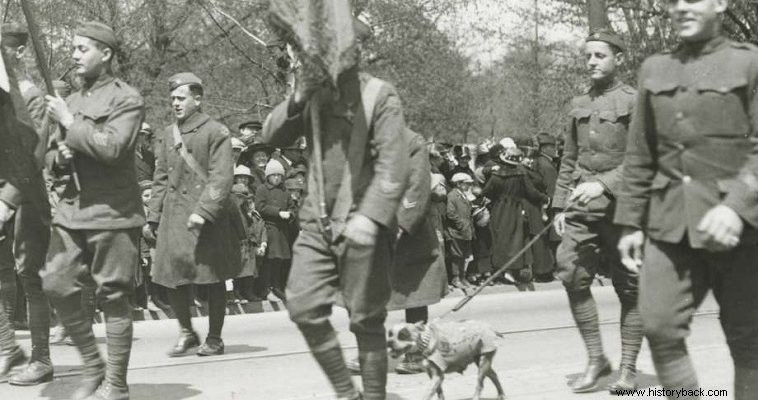
In 1917, in a park outside Yale University, a young American soldier, Robert Conroy, who had enlisted in the army after his country declared war on Germany, saw a small , hungry puppy roaming around. The soldier took pity on the puppy and adopted it, naming it Stubby.
Conroy took Stubby with him to camp, and soon the little dog had become his unit's mascot, learning to recognize different trumpets, and during the raising and lowering of the flag he would raise his tail vertically!
Stubby followed the soldiers even during training in the combat arena. At one point the 102nd Infantry Regiment, 26th Infantry Division, in which Conroy served, was sent to France to fight the Germans. Stubby also took the long way to France. The battalion arrived on the Western Front on February 5, 1918.
Little Stubby provided entertainment with his toys to the tired men. He also gradually got used to the sound of artillery and machine gun fire and showed no signs of fear. In a German gas attack Stubby inhaled gas, but was treated and recovered. Best of all, this experience trained his nose to recognize chemical gases.
Thus, when the Germans attacked again with chemicals, one morning after a continuous, overnight artillery bombardment, the men of the battalion, "dead" from vigilance and fatigue, did not realize it. Only Stubby understood and by barking and pulling the men by their pants managed to wake them up and save them from certain death.
Stubby didn't stop there. Thanks to his sense of smell and hearing, he discovered wounded soldiers in the dead zone, indicating to their colleagues where they had fallen, so that they could collect them.
He could detect enemy artillery shells crucial seconds before they hit the ground, giving the men time to take cover. Soon Stubby was a sort of unit barometer for any danger.
On one occasion Stubby uncovered a German who had approached the American trenches unseen. The German tried to charm the dog by speaking to him in German. But Stubby had learned to distinguish English from German and immediately pounced on the German, immobilizing him until American soldiers came and captured him.
For his action he was awarded the rank of sergeant by the soldiers, surpassing Conroy who was only a corporal. Even for Sergeant Stubby, however, the war was tough and he was seriously injured by a fragment of a German shell. But he survived the war, having participated, in his own way, in 17 battles, in the trenches of the Western Front.
When the war ended and Conroy and Stubby returned home, a hero's welcome awaited them. They were even welcomed by President Wilson. Conroy and Stubby remained together until 1926 when Stubby died. His body was embalmed and is kept in the Smithsonian institute, along with the honors he received.
Stubby was awarded a triple Meritorious Service Medal, the 26th US Infantry Division Medal, the St. Michel Battle Memorial Medal, the Sato Thierry Battle Medal, and the Purple Heart.
